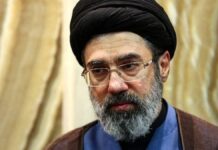X: @the_news_21
A horrific scene unfolded in Moscow on Friday night as assailants stormed into a large concert hall, unleashing a hail of gunfire that left over 60 people dead, more than 100 injured, and the venue engulfed in flames. The brazen attack occurred just days after President Vladimir Putin secured a resounding victory in a tightly controlled election, further entrenching his hold on power.
The Islamic State group swiftly claimed responsibility for the atrocity, announcing its involvement through affiliated channels on social media. According to a US intelligence official speaking to The Associated Press, American agencies had prior knowledge of the Islamic State’s plans for an attack in Moscow, particularly originating from their branch in Afghanistan, and had shared this information with Russian authorities.
Details surrounding the fate of the attackers remained murky as state investigators delved into the incident, classifying it as an act of terrorism. The assault, marked by gunfire and the subsequent inferno that consumed the concert hall’s structure, stands as the deadliest attack in Russia in recent memory, casting a pall over the nation as it continues its protracted conflict in Ukraine.
Moscow Mayor Sergei Sobyanin described the raid as a “huge tragedy,” while the Kremlin confirmed that President Putin was swiftly informed of the assault shortly after the assailants breached Crocus City Hall, a sprawling music venue on the outskirts of the capital, capable of hosting thousands.
The targeted concert was to feature a performance by the renowned Russian rock band Picnic, drawing crowds to the venue. The Investigative Committee, Russia’s premier criminal investigation agency, reported a grim toll of over 60 fatalities and a list of 145 individuals injured, with 115 requiring hospitalization, including five children.
As the nation reels from this appalling act of violence, questions loom over security measures and the broader implications for Russia’s domestic stability and international security landscape. The chilling assault serves as a stark reminder of the persistent threat posed by extremist elements and the challenges faced in safeguarding public spaces against such atrocities.
The aftermath of the attack underscores the urgent need for coordinated efforts, both domestically and internationally, to combat terrorism and prevent further loss of innocent lives, as authorities continue their investigations into this devastating assault on the heart of Moscow.








where can i buy generic clomid price buy cheap clomid no prescription where buy cheap clomid price how to get cheap clomid pill get cheap clomiphene pills clomiphene pills at dischem price order cheap clomid pill
This is the description of serenity I get high on reading.
Greetings! Very serviceable recommendation within this article! It’s the little changes which choice obtain the largest changes. Thanks a portion quest of sharing!
buy azithromycin no prescription – buy zithromax 500mg order metronidazole sale
buy rybelsus pills – semaglutide pills order periactin 4mg pills
motilium usa – sumycin 500mg oral buy flexeril 15mg pill
buy augmentin 1000mg – atbioinfo buy acillin without prescription
purchase nexium pills – https://anexamate.com/ buy esomeprazole 20mg
purchase medex pills – blood thinner order losartan 50mg online cheap
buy mobic no prescription – moboxsin.com buy generic meloxicam
order deltasone 40mg without prescription – https://apreplson.com/ buy prednisone 10mg without prescription
top ed pills – fastedtotake buy ed pills
buy fluconazole 200mg – https://gpdifluca.com/# buy diflucan 100mg for sale
cenforce 50mg pill – https://cenforcers.com/# cenforce 50mg cheap
tamsulosin vs. tadalafil – ciltad genesis cialis free trial 2018
order zantac sale – how to buy zantac ranitidine 300mg us
tadalafil citrate research chemical – cialis none prescription cialis for sale online in canada
sildenafil 100mg price – viagra sale new zealand cheap viagra online india
More posts like this would make the blogosphere more useful. sitio web
I’ll certainly return to skim more. zithromax usa
I’ll certainly return to read more. https://prohnrg.com/
This website exceedingly has all of the tidings and facts I needed to this subject and didn’t know who to ask. comment prendre fildena mg
I couldn’t turn down commenting. Warmly written! https://ondactone.com/spironolactone/
More posts like this would force the blogosphere more useful.
https://proisotrepl.com/product/cyclobenzaprine/
This is a keynote which is forthcoming to my fundamentals… Numberless thanks! Unerringly where can I notice the acquaintance details an eye to questions? http://forum.ttpforum.de/member.php?action=profile&uid=425012
forxiga 10mg price – on this site where to buy forxiga without a prescription
orlistat for sale – https://asacostat.com/ orlistat 60mg cost
More posts like this would prosper the blogosphere more useful. http://polishcrazyclan.ugu.pl/member.php?action=profile&uid=356914
You can protect yourself and your dearest by way of being cautious when buying prescription online. Some pharmacy websites operate legally and offer convenience, solitariness, rate savings and safeguards as a replacement for purchasing medicines. buy in TerbinaPharmacy https://terbinafines.com/product/zithromax.html zithromax
I couldn’t turn down commenting. Warmly written!
Đến với J88, bạn sẽ được trải nghiệm dịch vụ cá cược chuyên nghiệp cùng hàng ngàn sự kiện khuyến mãi độc quyền.
搭载智能站群程序,自动化搭建与管理,为SEO项目提供核心驱动力。站群程序
online casino australia
play online casino real money
online poker real money
mgm sports betmgm New Mexico betmgm South Dakota
Venture into a realm of virtual thrills and real rewards. crown coins casino official website offers customizable avatars for personalized gaming. Customize, play, and conquer!
Experience the ultimate candy adventure in Sweet Bonanza, where wins pay anywhere on the grid! Bomb sweet bonanza rtp multipliers can turn small bets into life-changing hauls. Join the fun right now!
Prairie thunder roars with every reel turn. buffalo slots offers sunset magic, bonus buffs, and massive cash herds. Join now!
Sign up at chumba casino games and get free Sweeps Coins instantly. Enjoy premium slots, daily bonuses, and the chance to redeem real rewards. Play now!
From Bitcoin to Dogecoin to Solana — Stake accepts them all with zero fees on stake plinko most deposits. Play your way.
DraftKings online casino Casino—your new favorite spot. Get 500 spins on Cash Eruption with $5 played + up to $1K safety net. Spin to win big!